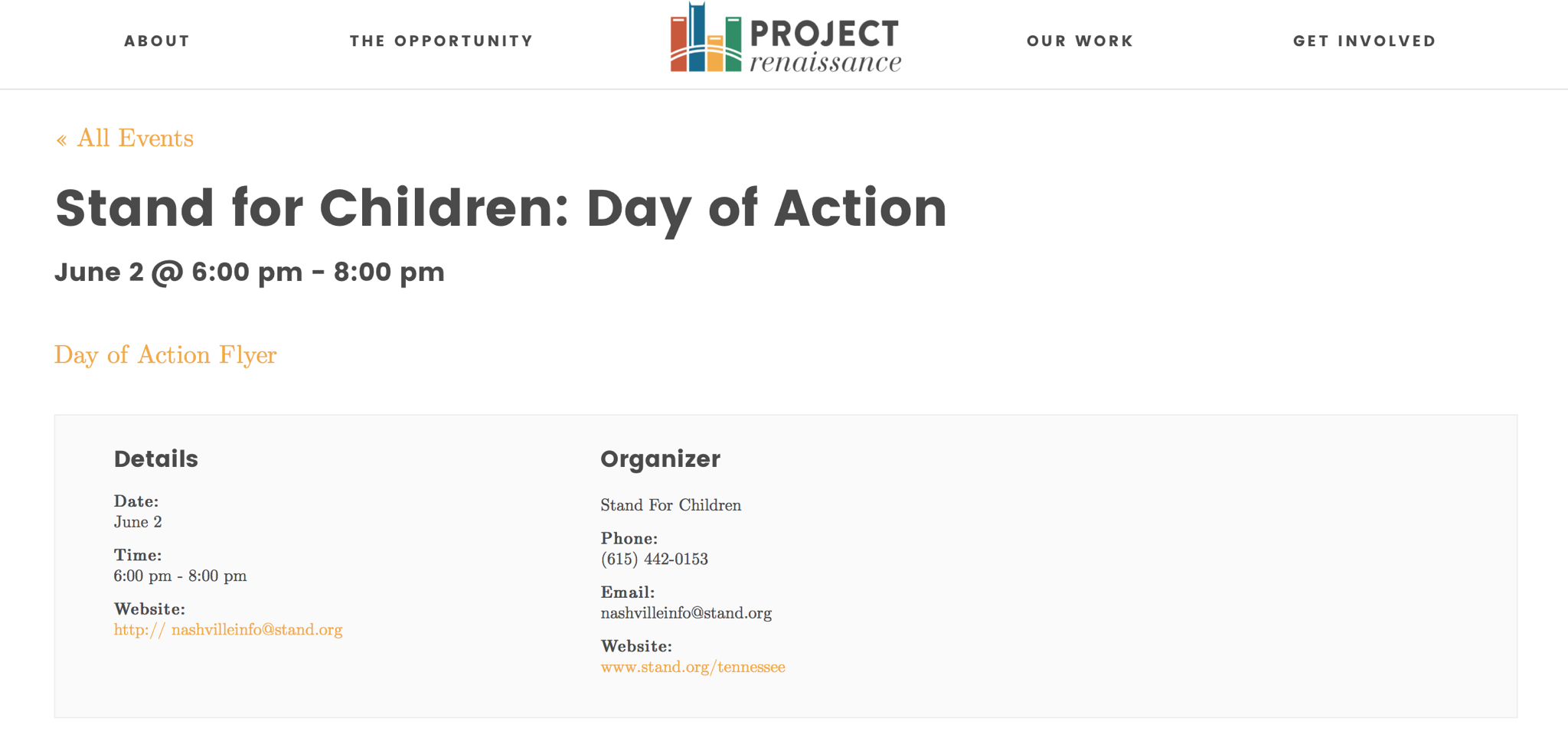The involvement of Project Renaissance/Nashville RISE in this year’s MNPS school board races has been the source of a bit of controversy, from promoting (then deleting) an event with Stand for Children to a Phil Williams story raising questions about the source of funding and lack of disclosure.
A group of incumbent board members have said they won’t attend the upcoming forum and Zack Barnes on this blog asks questions about that decision.
This all may seem a bit much over a group that bills itself as a grassroots collection of parents dedicated to improving school quality.
Of course, Nashville has seen what an organic grassroots schools movement looks like. Just look at East Nashville United as one example.
There’s something a little different about Renaissance/RISE and it merits further examination.
As the Phil Williams story points out, Nashville RISE is incredibly well-funded, backed by money from philanthropic interests and by supporters of the charter school movement. Also backed by some donors who don’t want their identities revealed.
But there’s more. Project Renaissance/Nashville RISE is part of a national network of groups known as Education Cities.
Here again, the mission sounds pretty nice:
Our members are nonprofit organizations that create and coordinate ecosystems that foster the growth of high-quality public schools in their respective cities. Together, our members are improving opportunities for millions of children and their families. To find out more about our members, please click on the map or list below.
But, it’s difficult to find a true “success” story among the so-called “Education Cities.”
A closer look at two cities with Education Cities member organizations that have impacted education policy reveals a need for caution.
First, a look at Minneapolis and a group called MN Comeback. Sarah Lahm reports on this group:
In Minneapolis, MN Comeback has been meeting privately for at least a few years, and busily concocting a vague but “doable” plan to “remake our entire city’s education system.” This plan centers on the creation of 30,000 “rigorous and relevant seats” across the city, in “sector agnostic” settings, meaning they don’t care where these seats are–charter, private or traditional public school–as long as they are “high performing.”
This may all sound quite familiar, in that the rhetoric of Renaissance/RISE and Nashville’s charter sector is consistently focused on quality “seats” rather than the children who occupy those seats.
Further, Lahm notes:
Clearly, the privately managed, privately funded MN Comeback–which bears no responsibility to the “seats” it hopes to serve–has had its hands in the Minneapolis schools for some time. And their range is focused: the CPS model is one of only three things being “supported” by MN Comeback, according to the Education Cities website. The other two are MinnCAN, whose flush, reformy thumbprints are all over every MN Comeback policy “team,” and the IFF, a Chicago-based nonprofit that specializes in real estate consulting for “low-income communities.”
Next, let’s turn to Indianapolis, where their version of Renaissance/RISE is called The Mind Trust. You guessed it, The Mind Trust is also an Education Cities member. Also, Project Renaissance lists Ken Bubp as a Board Member and notes his role as Vice President of The Mind Trust.
What you are about to read may sound eerily familiar, as current MNPS board member Amy Frogge recently raised concerns about the high cost of school board races in Nashville.
Regarding the education scene in Indianapolis, Justin Miller reports for the American Prospect:
At the epicenter of the city’s reform push was the Mind Trust, a local education-reform group that promotes more school choice, autonomy, and charter partnerships. To do those things, the district needed a friendly superintendent and a sympathetic school board. The Mind Trust helped bring in DFER, the advocacy group Stand For Children, and the network of political money that came with them.
Sound familiar?
Miller continues, noting how Mind Trust-friendly groups and donors helped dramatically increase the cost of School Board races in Indy:
By the end, Cosby had raked in a total of nearly $80,000. Two other reform candidates were elected with more than $60,000 in support, including $10,000 checks from former New York City Mayor Michael Bloomberg.
The purchase of the Indianapolis School Board by outside groups continued, as Miller notes:
In her campaign to oust Roof, who had been elected board president, from Roof’s at-large seat, Sullivan (the reform candidate) raised more than $70,000, inundating the city with mailers, phone-banking, and paid media. She trounced Roof by more than 25 percentage points.
Miller suggests that what happened in Indianapolis is part of a broader, national effort supported by the likes of the Broad and Walton Foundations.
And here’s something interesting about all that: The funders of Education Cities include The Broad Foundation, the Walton Foundation, and The Gates Foundation — the Big Three in corporate education reform.
Perhaps more interesting is the group of partners, including the pro-voucher Fordham Institute.
All of the above are big players in the drive to remake American public schools, though it is difficult for that group to point to a true “Education City” success story.
What is clear is Renaissance/RISE is following a playbook developed by outside interests. Looking to Minneapolis or Indianapolis can help us see where that playbook may lead Nashville.
For more on education politics and policy in Tennessee, follow @TNEdReport
